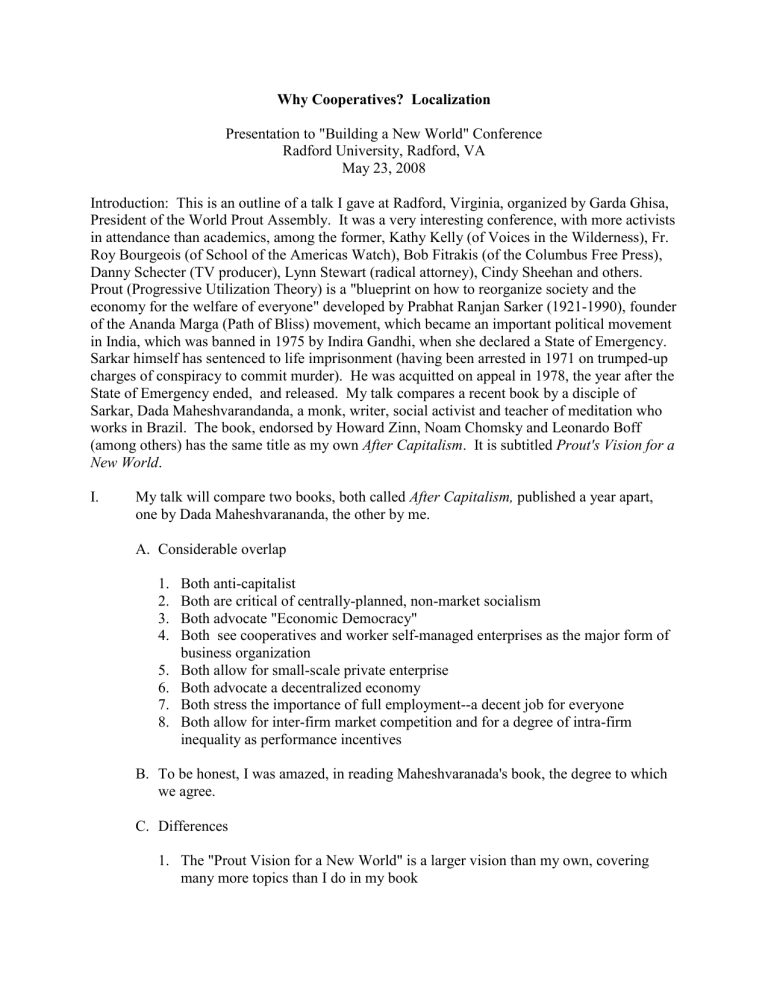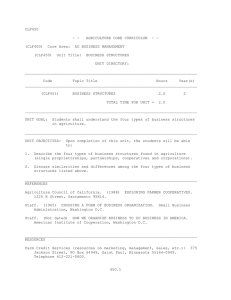Why Cooperatives? Localization Presentation to "Building a New World" Conference

Why Cooperatives? Localization
Presentation to "Building a New World" Conference
Radford University, Radford, VA
May 23, 2008
Introduction: This is an outline of a talk I gave at Radford, Virginia, organized by Garda Ghisa,
President of the World Prout Assembly. It was a very interesting conference, with more activists in attendance than academics, among the former, Kathy Kelly (of Voices in the Wilderness), Fr.
Roy Bourgeois (of School of the Americas Watch), Bob Fitrakis (of the Columbus Free Press),
Danny Schecter (TV producer), Lynn Stewart (radical attorney), Cindy Sheehan and others.
Prout (Progressive Utilization Theory) is a "blueprint on how to reorganize society and the economy for the welfare of everyone" developed by Prabhat Ranjan Sarker (1921-1990), founder of the Ananda Marga (Path of Bliss) movement, which became an important political movement in India, which was banned in 1975 by Indira Gandhi, when she declared a State of Emergency.
Sarkar himself has sentenced to life imprisonment (having been arrested in 1971 on trumped-up charges of conspiracy to commit murder). He was acquitted on appeal in 1978, the year after the
State of Emergency ended, and released. My talk compares a recent book by a disciple of
Sarkar, Dada Maheshvarandanda, a monk, writer, social activist and teacher of meditation who works in Brazil. The book, endorsed by Howard Zinn, Noam Chomsky and Leonardo Boff
(among others) has the same title as my own After Capitalism . It is subtitled Prout's Vision for a
New World .
I.
My talk will compare two books, both called After Capitalism, one by Dada Maheshvarananda, the other by me.
published a year apart,
A.
Considerable overlap
1.
Both anti-capitalist
2.
Both are critical of centrally-planned, non-market socialism
3.
Both advocate "Economic Democracy"
4.
Both see cooperatives and worker self-managed enterprises as the major form of business organization
5.
Both allow for small-scale private enterprise
6.
Both advocate a decentralized economy
7.
Both stress the importance of full employment--a decent job for everyone
8.
Both allow for inter-firm market competition and for a degree of intra-firm inequality as performance incentives
B.
To be honest, I was amazed, in reading Maheshvaranada's book, the degree to which we agree.
C.
Differences
1.
The "Prout Vision for a New World" is a larger vision than my own, covering many more topics than I do in my book
a.
Spirituality b.
Sustainable agriculture c.
Education d.
World government e.
LOCALIZATION
2.
My book has a different take on regional investment and on transition
II.
Localization
A.
I am deeply sympathetic to the notion of localization, to the idea of local production, and regional self-sufficiency for reasons of a.
Environmental sustainability b.
Community stability c.
Psychological health
B.
Of course one must be dialectical here: citizens of the new society should be at once more rooted in their communities than they are at present, and, simultaneously, more conscious that they are at the same time citizens of the world. Such a consciousness is by no means impossible to attain. What might seem to be a contradiction need not be. Indeed, I would argue that a secure sense of rooted identity makes one less fearful of difference, of the "other," better able to empathize with and appreciate both our cultural differences and our common humanity.
C.
Cooperatives are particularly appropriate for local production for at least one very important structural reason--they do not have the same tendency toward cancerous growth as to capitalist firms
1.
Cooperatives tend to maximize profit per-worker, not total profits
2.
This means that cooperatives, even when highly successful, tend to remain local
3.
Cooperatives in one region do not drive cooperatives in another out of business-there's no "grow-or-die" imperative to a cooperative; instead successful innovations tend to be copied
4.
Productivity increases tend to translate into increased leisure, so a steady-state economy (in terms of consumption) is perfectly compatible with increasing wellbeing
III.
As for differences between the two "After Capitalisms," two that stand out are connected to the question of transition
A.
I do not think that regional investment should be funded locally. I argue that there should be a flat-rate national capital-assets tax on all businesses that generates society's investment fund. These tax revenues are then returned to regions on a percapita basis to be used for investment purposes. The point here is to block the
tendency of rich regions to become ever richer while poorer regions lag ever further behind.
B.
I think we need to press for the democratization of corporations before we can think of breaking them up into smaller units geared for local production--if indeed that is feasible at all.
C.
It's probably best to think of my version of Economic Democracy as a transitional model that could, over time, evolve into a more Proutist localized economy.



